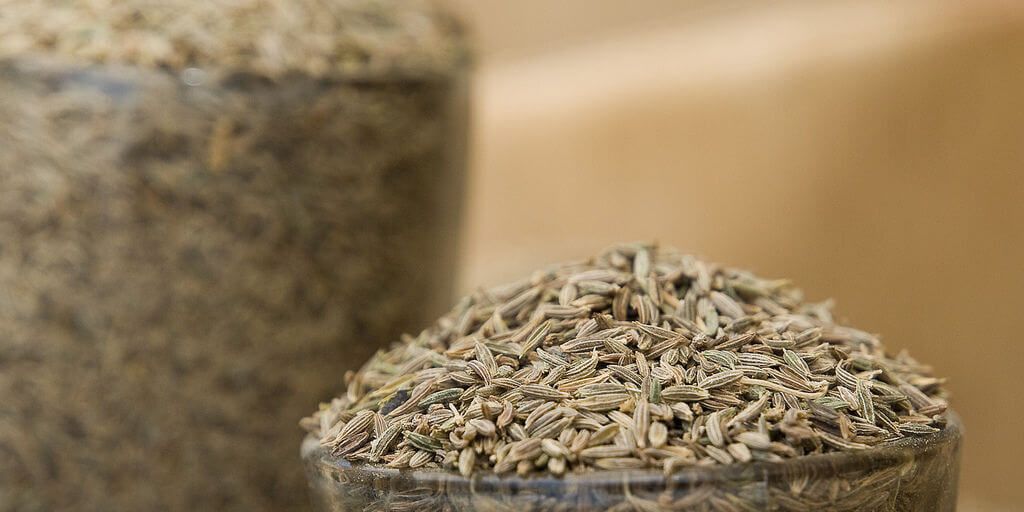Cumin (Cuminum cyminum) is a flowering plant in the Apiaceae family. It is an annual herb that grows to be about a foot tall (12 inches) and is native to China, Mexico, India and the Mediterranean. Its seeds are yellow-brown in color and they are harvested by hand. White or pink flowers blossom on the cumin plant during its three to four month growing period during the hot summers.
Culinary Use of Cumin Seeds
The small, flat Cumin seeds provide a peppery flavor that is used in Mexican dishes, as well as in combination with curry in Indian and Middle Eastern food. Some southern Chinese cooks use cumin seeds to give unique flavors their dishes. Cumin is similar to Caraway, coming from the same family of herbs, but has a stronger and coarser flavor and texture.
How to Use Cumin Seeds
Cumin seeds are used medicinally in various forms, including:
Whole Seeds: The whole cumin seeds are often used in cooking and herbal preparations. They can be added to dishes, ground into powder, or infused into teas.
Ground Cumin: Cumin seeds can be ground into a powder and used as a spice in cooking. Ground cumin is a common ingredient in many cuisines and spice blends.
Cumin Oil: Essential oil extracted from cumin seeds is used in aromatherapy and may have potential health benefits. Cumin oil is sometimes used in topical applications, massage oils, or diffusers.
Herbal Preparations: Cumin seeds are utilized in traditional medicine in various cultures. They may be used in herbal teas, decoctions, or formulations to address digestive issues, promote appetite, and alleviate mild symptoms.
Medicinal Properties of Cumin Seeds
The seeds of the cumin plant are the most valued and widely utilized part for culinary and medicinal purposes. They are small, elongated, and brown in color.
Digestive Aid: Cumin seeds are known for their carminative properties, helping to alleviate gas, bloating, and indigestion. They may also stimulate digestive enzymes.
Anti-Inflammatory: Cumin seeds contain compounds with potential anti-inflammatory effects, which may be beneficial for certain conditions.
Antioxidant: The seeds contain antioxidants that may help neutralize free radicals in the body.
Traditionally Used for Respiratory Conditions: In some traditional systems of medicine, cumin seeds have been used for respiratory conditions, such as coughs and bronchitis.
Health Benefits of Cumin Seeds
While quite plain in appearance, its health benefits are anything but plain. Cumin seeds are a great supplement for any diet, as Eastern cultures have known for thousands of years.
Cumin is high in iron and manganese, supplying seven and three percent respectively of the recommended daily value. It also supplies our bodies with calcium, many vitamins and fiber.
Here are some of the many ways in which cumin can help you:
Cumin Seeds are a Great Source of Iron
Cumin is a great source of iron which is key in keeping your immune system healthy and producing energy and maintaining your metabolism. Children, teenagers, women going through their menstural cycle and women who are pregnant or nursing need to consume more iron and cumin is an ideal source for obtaining iron.
Cumin Seeds can Relieve Colds, Fevers and Sore Throats
Cumin is high in vitamin C and its anti-fungal properties make it difficult to suffer long from a cold if you consume it regularly. Make up your own cold remedy by mixing one teaspoon of ground cumin in boiling water and allow to simmer for a few minutes. Let cool before drinking. For a sore throat, add some ground ginger along with the cumin.
Cumin Seeds Help with Digestion and Relieves Constipation
Cumin is well known for its effects on the digestive system. Cumin is said to prevent gas, stop diarrhoea amongst other things. Scientists have said that cumin aids in proper digestion of food and the body’s ability to absorb nutrients because the enzymes found in cumin help break down the food.
Thanks to the levels of fiber that is found in cumin, piles can be gotten rid of when consumed daily.
In addition, cumin’s anti-fungal properties will help to clean out the digestive tract.
Cumin Seeds May Prevent Cancer
As scientists do more research on cumin they are finding that it may also contain anti-carcinogenic properties which is key for preventing cancer. Lab rats who took cumin did not develop tumors like the others thanks to cumin’s ability to detoxify the liver and prevent free radicals from entering the blood stream. Cumin is a great way to help detoxify your body and keep your insides clean and healthy.
Cumin Seeds for Insomnia
Insomnia can be relieved by mixing a teaspoon of cumin powder with one mashed banana and eating before going to bed.
Cumin Seeds to Help with Breastfeeding
Cumin, taken with milk and honey, can help increase milk supply when consumed regularly.
Cumin Seeds to Maintain Healthy Skin
The vitamins found in cumin, both vitamin C and vitamin E, are essential for healthy, young looking skin. Cumin essential oils also keep fungal and microbial infections away.
Shopping
| Visit the new SHOPPING page for a wide selection of great products! |
Other Health Benefits of Cumin
Cumin may also strengthen bones, lower blood sugar, clear jaundice reduce muscle spasms and reduce seizures.
Cumin Essential Oil
Cumin essential oil is extracted from the seeds of the cumin plant. The seeds are the part of the plant commonly used for culinary and medicinal purposes. The process of making cumin oil involves extraction methods to obtain the aromatic compounds and essential oil present in the cumin seeds. Cumin oil is readily produced in the United States and is used for flavoring desserts, condiments and alcoholic beverages. It is also used as a fragrance in creams, perfumes and lotions.
Cooking with Cumin Seeds
It’s always best to use whole cumin seeds that you grind with a mortar and pestle, but cumin powder is more convenient though it loses its flavor faster than whole seeds. Whole seeds will keep for a year, when stored in a cool, dark place, while powder should be used within six months. For enhanced flavor, you may roast cumin seeds before using them.
Boil some cumin seeds in water and steep for eight to ten minutes for a soothing tea. Sauté vegetables and toss with cumin powder for a tasty vegetarian dish. Cumin is great sprinkled on rice and beans to give extra flavor. In Eastern cultures cumin is mixed with black pepper and honey as an aphrodisiac but this combination is also tasty when put on fish, chicken and vegetables.
Always take care when taking herbs and Read Our Disclaimer.
Cumin Notes / Side Effects
Cumin is generally safe and beneficial when used in typical culinary amounts, but excessive consumption or sensitivities can lead to side effects.
Potential issues include:
Digestive Problems: Heartburn, acid reflux, gas, bloating, and diarrhea.
Allergic Reactions: Skin rashes, itching, hives, sneezing, coughing, or asthma.
Blood Sugar and Clotting: Can lower blood sugar, potentially causing hypoglycemia; may have a mild blood-thinning effect.
Liver and Kidney Health: Rare reports of liver toxicity with high doses; potential adverse effects on kidney function.
Hormonal Effects: Contains compounds that may mimic estrogen, affecting hormone-sensitive conditions.
Drug Interactions: May interact with antidiabetic drugs, anticoagulants, and antiplatelet drugs.
Moderation is key, and individuals with specific health conditions or those taking medications should consult a healthcare provider before using cumin supplements or consuming large quantities.



Leave a Reply